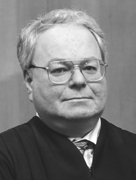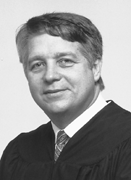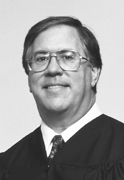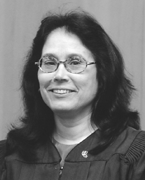



REINHOLTSEN, FEENEY, CISSNA, MILES

by Rosemary Edmiston
Come the end of the year, Judge J. Michael Brown will be the oldest
and longest-seated justice presiding within Humboldt County's courts.
"It's going to be just me -- the only one left," said the 57-year-old civil court judge as he relaxed in his chambers.
With his signature mug of coffee close by, Brown recalled his first 15 years on the bench, when he served side-by-side with retiring Judge John Buffington and the late William F. Ferroggiaro. Today, however, nothing is as it was within the halls of justice. When it comes to change, Humboldt County's judicial system has undergone a metamorphosis over the past several years, with more in store.
Two deaths and several retirements have resulted in a younger generation of judges taking over the bench, the majority of whom were appointed by Republican Gov. Pete Wilson.
At the same time, a nationwide trend to consolidate Municipal and Superior courts has been moving forward here, further rocking a once stalwart government institution.
Eureka attorney Phil Arnot, who has been practicing law in Eureka since 1964, doesn't recall ever seeing such a dramatic turnover on the bench.
"It's been kind of a unique situation," he said. "We've had deaths, retirement."
"(The turnover) is rather remarkable," said Court Executive Officer Charles Cliver.
By the end of 1998, Humboldt County will have seen five of the seven seats on the bench turn over within about two years.
"Exciting times," was how Judge W. Bruce Watson put it.
"It certainly gives pause for all of us in the courthouse to see these changes come. ... Time marches on."
That march began in 1996 after Municipal Court Judges John R. Morrison and Ronald Rowland retired. The following year, Superior Court Judge Ferroggiaro and Municipal Court Judge Dominic Banducci died within four months of each other. And in November, Buffington -- facing a highly unusual election-year challenge -- announced that he, too, would retire after 20 years on the bench. Three candidates are vying for his Superior Court seat. His six-year term expires at the end of the year. (See separate story.)
So far, Humboldt County has been very fortunate with the caliber of its judicial replacements, area attorneys say privately.
"We're lucky in Humboldt County not to have any truly terrible judges," said one attorney, referring to cases elsewhere that were appealed because a judge might have acted arbitrarily or failed to correctly apply the law.
While the attorney said he doesn't always agree with this county's judges, he has never witnessed corruption or bigotry from the bench. "And I have heard of judges around the state that do have such qualities."
In fact, the four newest judges appear to have won the respect of their colleagues, with particularly high marks going to Dale Reinholtsen, the longest-seated among the new group of judges and, many attorneys say, a natural for the bench.
Reinholtsen, 50, was the first of Gov. Wilson's Humboldt County appointments, taking office in July 1996. A longtime Eureka attorney and former deputy district attorney, he was recently elevated from Municipal to Superior Court to replace Ferroggiaro. The appointments that followed, within days of each other in late 1997, were Eureka attorney John Feeney and Arcata attorney Timothy Cissna. Cissna took over Reinholtsen's Municipal Court seat mid-term, while Feeney replaced Banducci.
Feeney and Cissna's terms are up in 2000, at which time they will have to seek election. Reinholtsen's term also expires in 2000.




REINHOLTSEN, FEENEY, CISSNA, MILES
Attorney Marilyn Miles is the only recent newcomer actually elected to the bench, winning her seat in November 1996 following a hotly contested race for the position held for 25 years by Judge Rowland.
The primary election for Buffington's seat is June 2. The salary is $107,000 annually.
All three Wilson appointees were among a pool of area attorneys seeking Morrison's Municipal Court seat in 1996. When the two judges died, the governor's office went back to that pool to find replacements.
The selection process is somewhat grueling, but markedly different from an election. Scrutiny doesn't come from the public, but rather from the legal community and some business leaders.
Candidates must first pass the state Commission on Judicial Nominees Evaluation. Then Humboldt's judges and some attorneys, as well as bar members outside the area, are asked to comment on the candidates' qualifications. Two interviews follow.
The system apparently works well.
"I think the governor did a phenomenal job in his appointments, just great," Judge Brown said.
Retired Judge Morrison recalled hearing within a 12-hour period that Feeney and then Cissna had been appointed to fill the vacancies.
"I think everyone was delighted because those three top people who had been on the governor's list beforehand, that we all felt were equally qualified, ended up in judgeships here in Humboldt County much to the benefit of the whole system. Three exceptionally well qualified young lawyers," said Morrison, who continues to work as a visiting judge.
With three Wilson appointees in place, the political makeup of the bench has shifted since the days when the justices were largely appointees of Democratic Gov. Jerry Brown Jr. But party affiliation should make no difference in a trial court, attorneys and judges say. And in Humboldt, they say, that premise has held true.
"I think we are all who we are and not a label that someone would put on us," Cissna said. "We bring our experiences, we bring our education. That's not to say I probably would not have been appointed if I wasn't a Republican, but I don't have some particular agenda because I'm Republican."
Of the three appointees, Cissna, 47, is characterized by some of his colleagues as the most conservative of the group.
Feeney and Reinholtsen, attorneys say, are moderates.
"I think Wilson is in for a hell of a surprise with Reinholtsen," one civil attorney said. "I think he's going to be much more moderate than the appointing powers think he's going to be. They didn't get some looney tunes conservative."
If he had to label himself, Feeney, 46, would agree with the term moderate.
"I don't think I have any extreme opinions or views on any of the issues," he said. "That's really my impression around the court house here as far as the other judges. I don't see any extremism."
Part of what makes a good judge, in fact, is someone who can set aside personal beliefs in the courtroom. A notable example, attorneys say, was when the late Judge Ferroggiaro imposed the death penalty in a murder case despite being morally opposed to that form of punishment. Jackie Ray Hovarter remains on death row for the 1984 kidnapping, rape and murder of a teenage girl from Willits.
After all, Judge Brown said, trial court judges must simply follow the law whether they agree with it or not.
"The ideal judge sets aside personal beliefs and listens to the facts and applies the law," said Watson, who has been on the bench six years.
Third in a class of 163 students when he graduated from law school in 1972, Reinholtsen appeared to sail through the awkward first weeks on the bench that other judges refer to as the "learning curve."
"Dale has the potential for being every bit as good a judge as Ferroggiaro. A very nice man, very fair," said one Eureka attorney who specializes in civil cases.
Cissna also seemed well-suited for his new role.
"The first day I started in the morning with a felony jury trial that is still underway," he said in February. "I handled the normal arraignment and pretrial calendars and preliminary hearings. ...
"I liken it to the old fashioned way of trying to teach someone how to swim by throwing them off the end of the dock. I jumped in with both feet and so far we have made it."
Attorney Russ Clanton was in Cissna's courtroom his first days on the bench. "I was really amazed how well he was doing up there. It was as though he had been there a year,"
The final appointee, Feeney, had been on the bench just two days when he sat down to talk with The Journal.
"I'm a veteran," he said with a laugh, adding, "The first observation I had is you have to pay attention 100 percent of the time. And it certainly is a different perspective having everybody face you."
The most difficult aspect of going from attorney to judge, say those who have been elevated to the bench, is the shift from representing one side or the other.
"It's completely different because as an attorney you're an advocate and as a judge you must make a constant effort to stay away from advocacy. But I haven't found that aspect to be at all difficult," Cissna said.
Both Cissna and Feeney say they sought a seat on the bench for the same reason -- the challenge.
The position also brings with it status and, certainly, power. As one judicial candidate said, trial court judges have the ability to marry people, grant divorces, decide child custody and take children away from their parents. They can seize a person's property and even sentence a person to death.
"There aren't that many people that wield that kind of power," the candidate said.
A large man with an authoritative air about him that suits a judge, Cissna was born in San Francisco but moved to Humboldt County when he was just 2. His father, the late Norman Cissna, was an attorney here for 30 years. When Tim Cissna began to practice law in late 1976, he joined his father's practice.
He has experience in both criminal and civil law, but was considered to be primarily a civil attorney. Cissna lives in Eureka with his wife and 18-year-old son.
He was described by another civil attorney as a little stubborn and opinionated, while Feeney is said to be a "nice, mild sort of guy." Another attorney, in criminal practice, sees Cissna as having a "very judicial manner." His courtroom, the attorney said, is run as his law practice was -- crisp and orderly.
Feeney, who is also married and has two sons, 10 and 16, is the only new judge who did not grow up in Humboldt County. Born and raised in San Diego, he moved to Eureka in 1980 after graduating from law school. He "dabbled" in criminal law in the early days, but his career has been that of a civil attorney.
He has been criticized for having minimal trial experience, the same criticism leveled at elected Judge Miles. And while trial experience is a definite plus, insiders say the know-how that comes with being in the courtroom on a daily basis is something that can be acquired with time.
As Miles said during her 1996 campaign: Having a thorough knowledge of due process, being able to handle constitutional questions, and applying the law correctly "are even more important than day-to-day prosecutorial experience. Otherwise, you're just going to be reversed on appeal."
When Cissna, Feeney, Miles and Reinholtsen took their seats on the bench, they joined the Municipal Court. (Reinholtsen has since been elevated to Superior Court.) Yet every judge in the Humboldt County judicial system now hears both Municipal and Superior Court cases.
In the court's eyes, there is no distinction. But on paper, they are still ranked as lower court justices, those who historically handled misdemeanor cases, and upper court justices, where felony crimes and major civil action was heard.
To eliminate this sort of class system on the bench, California law must catch up.
On June 2 a constitutional amendment goes before the voters asking that Municipal and Superior branches be united. If it passes, the 4-year-old process of court consolidation in Humboldt County will be complete and there will be no distinction between the Municipal and Superior benches.
As part of the on-going consolidation process, the judges also reorganized their departments. Now, one judge handles civil matters, one judge handles family matters and the remaining justices deal with criminal cases. Overlap is minimal, according to Brown.
"We've changed the way we're doing business. People don't seem to understand that," he said.
The attorney who wins the election for Buffington's seat is expected to take over the family court and remain in that position for about three years, said Judge Watson, who will become presiding judge when Buffington retires.
"The person isn't getting elected to be the family law judge. They're elected to a superior court seat," he said.
Humboldt County's justices -- who operate under the auspices of the state -- have also established what is known as a terminal digit system in which particular criminal cases are handled by one judge from start to finish. Along with that, court calendars have also been revamped.
Reaction has been mixed.
Attorneys say family law cases are being handled more effectively and civil cases, under Brown's jurisdiction, are moving along at a much faster clip. But the scheduling changes have left some attorneys baffled and scrambling to keep up.
"There is a lot of what appears to be experimentation going on, that in the long run isn't going to work," said Clanton, a private attorney.
But Humboldt County Public Defender Jim Steinberg is pleased with the changes. It allows him to more easily assign work to his deputies and assures equality with case load.
For private attorneys it's more difficult, Brown acknowledged.
"It presents some problems, there's no question about it, to a sole practitioner," he said. "It's very difficult for a sole practitioner if he has to be in more than one court at a time. Of course that's been true forever."
"A lot of people are unhappy with change and that can be for a whole lot of reasons," said Court Executive Officer Cliver, who likens the revisions in the courthouse to "the first 90 days of the Republic."
"It takes a while for people to psychologically catch up with a major change."
Reviled by some and praised as a genius by others, Cliver will retire April 20. He will be replaced by Dwight Clark, who comes to Humboldt from the U.S. Bankruptcy Court for the Northern District of California and the San Francisco Municipal Court.
Clark, who as court executive officer will oversee both the Municipal and Superior Courts, will work with Judge Watson, who will take over as presiding judge from the retiring Buffington.
For Brown, this relatively new system works.
"Judges are trying to do what they're paid for -- that's to judge cases, not be administrators."
The court executive model, Brown said, is "here to stay. No matter what the county says."
On April 22 Morrison celebrates 23 years as a jurist in Humboldt County. The court may have transformed over that period, but his work is no different, he said.
"The structure has changed, the faces have changed, but the job has remained the same," said the 65-year-old visiting judge. "You know the three former superior court judges -- Ferroggiaro, Buffington and Brown -- were all political appointees. And we were very fortunate to have those three young men come when they did.
"Now we have three political appointees who are equally as qualified, by a different governor, but bring that same sense of forward-looking and remain at the forefront of development of the court structure in California.
"The job is the same, the faces are different."
Comments? E-mail the Journal: ncjour@northcoast.com
The North Coast Journal Table of Contents
The Redwood Country On-Line Homepage